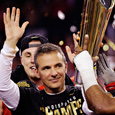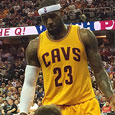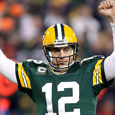Lakers take Game 1 Posted by John Paulsen (05/20/2009 @ 12:45 am) 
With an efficient 39 points from Carmelo Anthony, it looked like the Nuggets might pull the upset in Game 1, but a key steal by Trevor Ariza and some clutch play from Kobe Bryant sealed the Laker win, 105-103. The Lakers struggled early on, and with Anthony scoring 16 points in the first quarter, the Nuggets led by eight after the first period. As the game wore on, it became clear that the Nuggets are simply tougher than the Lakers. Anthony, Chauncey Billups, Kenyon Martin, Nene, Chris Andersen, Anthony Carter, and even Dahntay Jones — they’re all tough players, both mentally and physically. How many Lakers fit that description? Kobe? Yep. Derek Fisher? Yep. Anyone else? Not really. But Kobe is a closer. He had 18 points in the fourth quarter, 40 on the game. He literally carried the Lakers offensively. And he did a great job on Billups for most of the game before having to switch to Anthony to try to slow him down. I was really impressed with how Kobe and Melo battled throughout the game. Anthony really stepped up on the glass and defensively, even though Bryant went off in the final quarter. The Nuggets made a few mental errors down the stretch. Carter’s bad pass led to the Ariza steal, and K-Mart had a bad, bad foul on Kobe Bryant when the game was tied with 0:30 to play. The questions about the Nuggets remain — do they know how to win in the clutch? This looks like it’s going to be a great series. The Conference Finals: The four trades that got us here Posted by John Paulsen (05/19/2009 @ 12:35 pm) 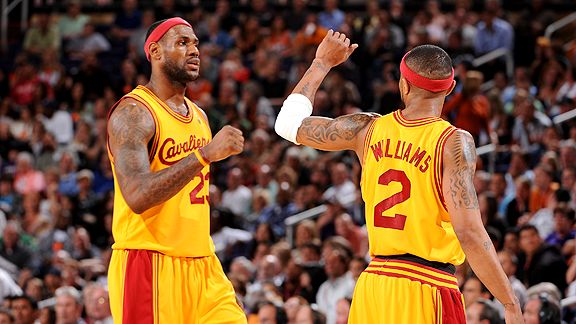
We’re down to four teams…Cavs/Magic…Lakers/Nuggets… What do they have in common? Star power, efficient offense, pretty solid defense, good coaching…check, check, check and check. But how about an aggressive front office? Each of these four teams made a major trade in the last two years. July 11, 2007: The Magic sign Rashard Lewis
This was a sign-and-trade, not a straight free agent signing, but the Magic only had to give up a conditional second round pick. The upside for the then-Seattle Supersonics was a trade exception worth $9 million. The contract (six years, $110 million) seemed outlandish at the time, and Lewis is still overpaid, but the Magic did what they had to do to get him. He’s a great fit for what Orlando is trying to do. They are built like the Rockets were in the Hakeem Olajuwon era — find a big man who commands a double-team, and surround him with great shooters. Lewis is the Magic’s version of Robert Horry in that he’s a lanky, versatile, sharpshooting big man. Strength-wise, he’s not built like a typical power forward, but since the NBA has gotten smaller and quicker over the past few years, he can get by against most teams. Offensively, he creates all sorts of problems for opposing power forwards as he can drill the long ball (career 39% from 3PT) or take it to the rack. He’s also pretty good in the post when teams try to defend him with a smaller player. Sure, the Magic overpaid on that contract, but I think it’s safe to say that if they hadn’t, they wouldn’t be in the Eastern Conference Finals right now. Lewis is a big, big part of Orlando’s recent success. GM Otis Smith deserves a lot of credit for having the cojones to pull the trigger on this deal. Read the rest of this entry » Posted in: NBA, NBA Finals Tags: 2009 NBA Playoffs, Allen Iverson, Chauncey Billups, Cleveland Cavaliers, Denver Nuggets, John Paulsen, LeBron, LeBron James, Los Angeles Lakers, Maurice Williams, Mo Williams, NBA Playoffs, Pau Gasol, Rashard Lewis, Rashard Lewis signing
Kobe Bryant and Lakers finish off Rockets in Game 7, look to Denver Posted by Kevin Kinsella (05/17/2009 @ 8:39 pm) 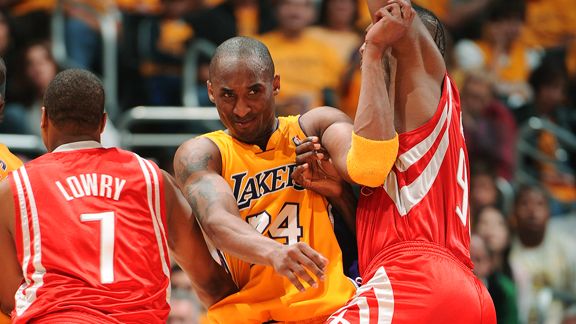
Well, the Lakers finally made it out of the Western Conference semi-finals. Certainly took them long enough. Arash Markazi from Inside the NBA at Sports Illustrated had an interesting quote after the game: When Kobe Bryant was asked what he learned about the Lakers after a grueling seven-game Western Conference semifinal series against the Rockets that culminated with an 89-70 win Sunday, he didn’t hesitate before answering. “That we’re bipolar,” Bryant said with a straight face.
Ya think? While I still whole-heartedly feel the Lakers are the best team in the West, it makes the upcoming series against the Nuggets seem like less of a sure-fire thing. The Lakers, and Kobe Bryant especially, really need to get their act together, take the proper meds or whatever, and regain some consistency. Their general level of play is high enough that most teams can’t touch them even on an off night, but the Denver Nuggets have a lot of fire in their eyes. Their games haven’t been as well publicized as any of the other potential conference finalists. But as any Detroit fan can tell you, with Chauncey Billups leading them anything could happen when he meets the Lakers. If Los Angeles can come into their next game on Tuesday with the same level of desire they showed against Houston today, they’ll get past the Nuggets handily. But with even the star-player admitting the team is mentally out of control, it’s anybody’s guess who will show up. If only this kind of wild variety made for more interesting basketball! The Houston/LA series was defined by a succession of surprise blowouts, something pretty boring for a neutral and bad for TV. I’m hoping the Nuggets can keep the Lakers on their toes. Posted in: Fantasy Basketball, NBA, Rumors & Gossip Tags: Chauncey Billups, Denver Nuggets, Houston, Houston Rockets, Kobe Bryant, Los Angeles Lakers, NBA Playoffs, Western Conference Finals, Western Conference Semi-Finals
What kind of point guard is he? Posted by John Paulsen (05/07/2009 @ 3:57 pm) 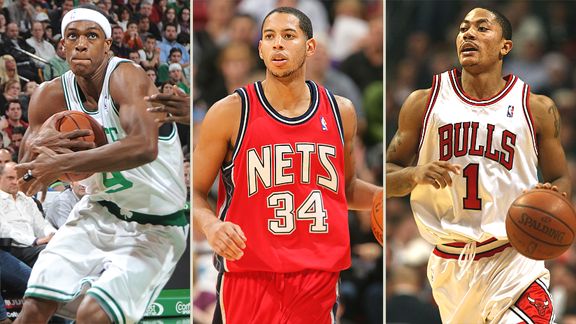
We hear it all the time. NBA analysts call one point guard “pass-first” and another “shoot-first.” Or they say one guy is “turnover-prone” while another “takes care of the ball.” But really, what makes a player a “pass-first” point guard? How carefree must he be with the ball to be considered “turnover-prone”? Taking an analytical approach to these questions, I decided to bust out an Excel spreadsheet and try to come up with some answers. Below you’ll see a graph that attempts to classify the top point guards in the league. But first, a little background… I chose to categorize each player based on two stats. First, to determine if he’s “shoot-first” or “pass-first,” I calculated the shot-to-assist ratio for each player. The bigger the number, the more of a “shoot-first” mentality the player has. Second, to determine whether or not a player is “turnover-prone,” I calculated each player’s assist-to-turnover ratio. I thought about using turnovers per 48 minutes, but I like the idea of including assists so that playmakers are rewarded for the positive as well as the negative. Next, I calculated each player’s Efficiency Per Minute (EPM) to see if there is any correlation between these other statistics and the overall efficiency of the player in question. Read the rest of this entry » Posted in: NBA Tags: Chauncey Billups, Chris Paul, Deron Williams, Derrick Rose, Devin Harris, efficiency per minute, EPM, Jameer Nelson, Jason Kidd, John Paulsen, Jose Calderon, Mo Williams, pass-first point guards, Player Efficiency Rating, Rajon Rondo, Ramon Sessions, shoot-first point guards, Steve Nash, Tony Parker, turnover-prone point guards
The NBA’s Top 10 Franchise Players Posted by John Paulsen (04/23/2009 @ 5:35 pm) 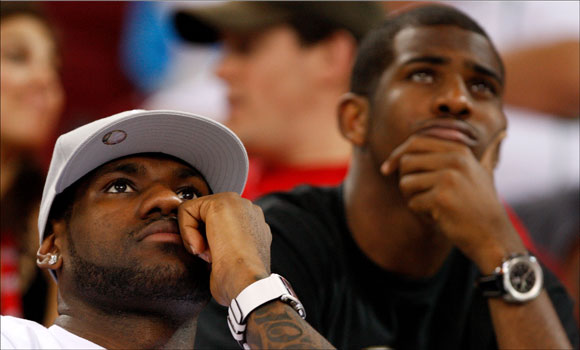
Every so often, I’ll be sitting at a bar, throwing back a few adult beverages with a buddy or two and I’ll pose the following question: If you could have one current NBA player to build your franchise around, with the goal of winning a NBA title in the next five years – who would it be? Since the 2009 NBA Playoffs are in their infancy, it seems to be as good of a time as any to kick around this question. My criteria are simple – a franchise player has to be able to carry his team, while being reasonably young and injury-free. We’ll count down from #10 to #1. My top nine guys were pretty easy to list, but #10 was a bitch. Maybe you can help me decide. Feel free to provide your own top 10. HONORABLE MENTION Yao Ming, Rockets (28 years-old)
I love Yao’s post up game, and he is a skilled passer, but the chances are only 60/40 that he’ll be healthy for any given playoffs and those odds are only going to decrease as time wears on. He’s like Robert Downey, Jr. — he’s great at what he does, but you just don’t know if he’s going to be there when you need him. Chauncey Billups, Nuggets (32)
He seems to be more responsible than ‘Melo for the Nuggets’ great play this season, but he’s 32 years old. Still, his effectiveness depends more on strength, steady play and good shooting than it does his (somewhat limited) athleticism, so he should be able to play into his late thirties. Al Jefferson, Timberwolves (24)
Jefferson is one of the few young, back-to-the-basket post players in the league. He averaged 23/11 on a bad team, which leads me to believe he could post 19/10 on a playoff team, and should only get better with age. Amare Stoudemire, Suns (26)
He’s four years younger than our next guy, but he’s already had two serious injuries in his career so one wonders if this is a trend. He also seems to be a little bit on the selfish side and has a rep for being a bad defensive player. Read the rest of this entry » Posted in: NBA Tags: Amare Stoudemire, Brandon Roy, Carlos Boozer, Carmelo Anthony, Chauncey Billups, Chris Bosh, Chris Paul, Deron Williams, Derrick Rose, Dirk Nowitzki, Dwight Howard, Dwyane Wade, Joe Johnson, John Paulsen, Kevin Durant, Kevin Garnett, Kobe Bryant, LeBron James, max contracts, Paul Pierce, Tim Duncan, Tony Parker, Yao Ming
|







